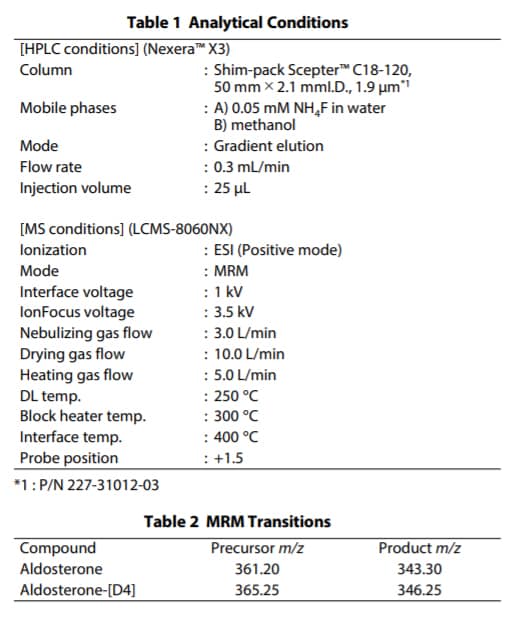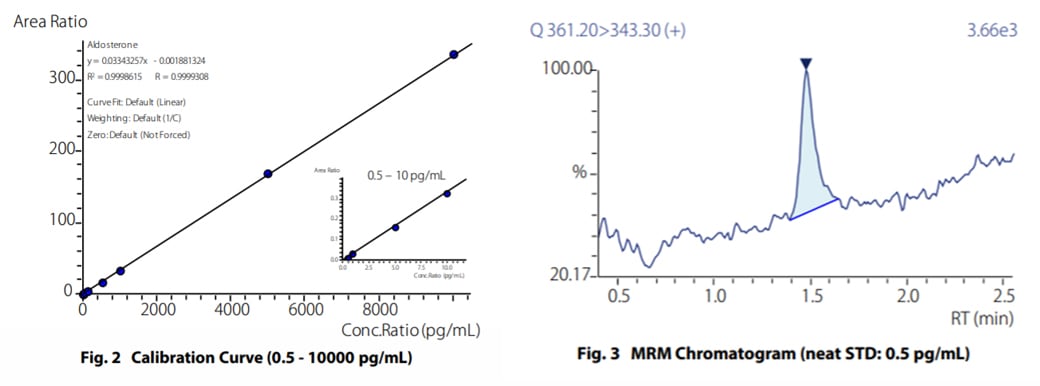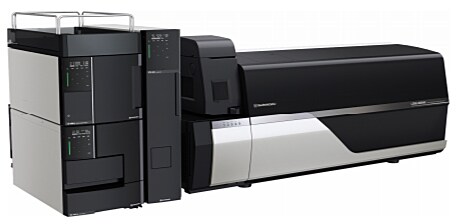High Sensitivity Analysis of Aldosterone in Human Serum Using LCMS™-8060NX
This report introduces an example of high sensitivity analysis of aldosterone in serum using LCMS-8060NX, a triple quadrupole mass spectrometer. Calibration curves prepared using standard samples showed linearity in the concentration range of 0.5 - 10000 pg/mL (R2 =0.9998), with %RSD of concentration of 3.96% at the lower limit of quantification and accuracy at each calibration point ranged from 95.58 - 109.84%. Furthermore, the accuracy of serum samples spiked with aldosterone (1 pg/mL) was 106%, indicating that the method used in the analysis is suitable for the actual samples. Aldosterone (Fig. 1), a mineralocorticoid produced in the cortex of the adrenal gland, plays key roles in the homeostasis of electrolytes, circulating blood volume and blood pressure regulation. The aldosterone levels in blood are used for diagnosis of hypertensive diseases, such as primary hyperaldosteronism, diabetic nephropathy or nephritis interstitial, etc. For the measurement of aldosterone levels, radioimmunoassay (RIA) or enzyme immunoassay (EIA) has been used, but the aldosterone concentration levels measured using the immune responses may be greater due to the cross reaction with steroid hormones having similar structures in the samples. The use of LC/MS/MS with high selectivity prevents the problems caused by the conventional method and enables more accurate quantitative analysis. This report introduces an example of high sensitivity quantitative analysis of aldosterone in serum using LCMS-8060NX.
Sample Preparation

Fig. 1 Structural Formula of Aldosterone
Standard samples were serially diluted with 50% methanol, prepared at concentrations of 0.5 - 10000 pg/mL and used for preparation of the calibration curve. For the samples spiked with serum, commercially available steroid-free human serum was spiked with aldosterone to make a serum concentration of 1 pg/mL. The standard sample and internal standard were spiked with 100 µL of serum, and then shaken well with a mixture of hexane and ethyl acetate (9 : 1). The solution obtained was centrifuged for 10 minutes, followed by evaporating the organic solvent layer to dryness, and then re-dissolved with 50% methanol.
Analytical Conditions

The analytical conditions for HPLC and MS are shown in Table 1. The MRM transitions are shown in Table 2.
Calibration Curve
The calibration curve prepared using the standard sample (internal standard method, n=3 for each concentration) showed good linearity in a wide dynamic range from 0.5 - 10000 pg/mL with a coefficient of determination (R2 ) of 0.9998. The %RSD of concentration at the lower limit of quantification was 3.96% with the accuracy at each calibration point ranging from 95.58 - 109.84%. Fig. 2 shows the calibration curve, and Fig. 3 shows the MRM chromatogram of the 0.5 pg/mL standard solution.

Sample Spiked with Human Serum

captionText
Based on the area obtained by the measurement of the pretreated sample, the aldosterone level was calculated using the calibration curve shown in Fig. 2. Good accuracy was obtained and the mean level of aldosterone spiked at 1 pg/mL with serum was 1.06 pg/mL (n=3). Fig. 4 shows the MRM chromatogram of the sample spiked with human serum.
LCMS-8060NX
The LCMS-8060NX is a triple quadrupole mass spectrometer with world-class sensitivity and detection speeds. It boasts increased robustness and ease of use as well as Analytical Intelligence to maximize your laboratory’s output.



